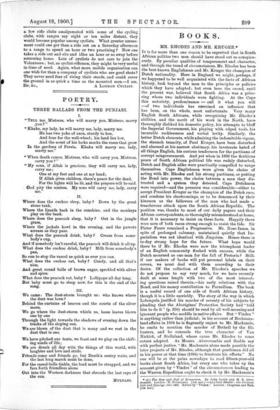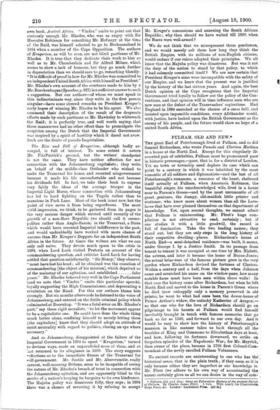BOOKS.
MIL RHODES AND MR. KRUGER.* IT is for more than one reason to be regretted that in South African politics two men should have stood out so conspicu- ously. By peculiar qualities of temperament and character, and through the trend of circumstances, Mr. Rhodes has been the best-known Englishman and Mr. Kruger the champion of Dutch nationality. Here in England we might, perhaps, if we happened to be well acquainted with the facts of African history, look beyond the men to the principles or policies which they have adopted; but even here the crowd, until the present war, believed that South Africa was a prize- ring where two individuals were fighting. At the Cape this notoriety, predominance — call it what you will —of two individuals has exercised an influence that has been, on the whole, most unfortunate. Very many English South Africans, while recognising Mr. Rhodes's abilities, and the merit of his work in the North, have thoroughly disliked his domestic policy, his attempts to bluff the Imperial Government, his playing with edged tools, his incurable recklessness and verbal levity. Similarly, the better Dutch elements, while admiring the indomitable vigour, the staunch tenacity, of Paul Kruger, have been disturbed and alarmed at his narrow obstinacy, his inveterate hated of all things English, his curious tenderness for the partisans of corrupt misgovernment. And yet when in 1896 the fictitious peace of South African political life was rudely disturbed, Dutch and English alike were practically compelled to range themselves. Cape Englishmen were given the choice of acting with Mr. Rhodes and his strong partisans, or putting the Bond into power, the choice between a man they dis- trusted and a system they detested. Cape Dutchmen were required—and the pressure was considerable—either to accept President Kruger as the champion of the Dutch race, and condone his shortcomings, or to be denounced by their kinsmen as the followers of the man who had made a treacherous attack upon the South African Republic. The position was, thanks to most of our daily papers and their African correspondents, so thoroughly misunderstood at home, that it is necessary to insist on these facts. Happily there were men of both races strong enough to resist the tide. Sir Pieter Faure remained a Progressive. Mr. Rose-Ines, in spite of prolonged calumny, maintained quietly that Im- perialism was not identical with Jingoism. Hence there is to-day strong hope for the future. What hope would there be if Mr. Rhodes were now the triumphant leader of an English community flushed with success, while the Dutch mourned as one man for the fall of Pretoria?
if our makers of books will put personal labels on their covers, we must deal with them according to their desire. Of the collection of Mr. Rhodes's speeches we do not propose to say very much, for we have recently dealt at some length with two of the most interest- ing questions raised therein,—his early relations with the Bond, and his money contribution to Parnellism. The book is a useful record of one side of South African history, though it is a little unwieldy. The story of the way in which Lobengula justified his murder of seventy of his subjects by pleading that the Aborigines' Protection Society had " told him to do it " (p. 350) should be read by all well-meaning and ignorant people who meddle in native affairs. But " Vindex " is anything rather than judicial; in his account of Bechuana- land affairs in 1884 he is flagrantly unjust to Mr. Mackenzie, he omits to mention the murder of Bethell by the fili- busters, and he conceals the true character of Van Niekirk, of Stellaland, whose cause Mr. Rhodes to some extent adopted. As Messrs. Abercrombie and Scoble say with perfect justice, " Mr. Mackenzie alone made possible the later projects of Mr. Rhodes, although that gentleman did all in his power at that time (1884) to frustrate his efforts." No one will be at the pains nowadays to read fifteen-year-old books about South Africa, but every one who takes up the account given by " Vindex " of the circumstances leading to the Warren Expedition ought to check it by Mr. Mackenzie's
• (L) The Rise and Fail of Krugerism. By John Scoble and H. IL Aber- crombie. London : W. Heinemann. [10s. net.)—(2.) Cecil Rhoda : his Political Life and Speech:a, /881-1800. Edited by " Viadel: London : Chapman and Hall. Ilea net.] own book, Austral Africa. " -Windex" omits to point out that curiously enough Mr. Rhodes, who was so angry with Sir Hercules Robinson for consulting Mr. Hofmeyr at the time of the Raid, was himself selected to go to Bechuanaland in 1884 when a member of the Cape Opposition. The authors of Srugerism, as will be seen, are not blind partisans of Mr. Rhodes. It is true that they dedicate their work to him as well as to Mr. Chamberlain and Sir Alfred Milner, which seems to show a lack of humour, but they go much further in depreciation than we should care to go, remarking blandly: "It is difficult of proof in how far Mr. Rhodes was committed to an independent United South Africa with himself as President." Mr. Rhodes's own account of the overtures made to him by a Mr. Borckenhagen (Speeches, p. 827) is a sufficient answer to such a suggestion. But our authors—of whom we must speak in this indiscriminate way, since they write in the first person singular—have some shrewd remarks on President Kruger's early hopes of winning Mr. Rhodes to be his agent. We also commend their description of the result of the desperate efforts made by such partisans as Mr. Hawksley to whitewash the Raid; it is perfectly true, and well worth saying, that these manoeuvres had no other effect than to promulgate the suspicion among the Dutch that the Imperial Government was inspired by a spirit of hostility which it dared not avow. Such are the fruits of pseudo-Imperialism.
The Rise and Fall of .1frugerism, although badly ar- ranged, is full of interest. To some extent it covers Mr. FitzPatrick's ground, but the writers' standpoint is not the same. They have neither affection for nor connection with the Johannesburg capitalists; they write on behalf of the middle-class Outlander who wished to make the Transvaal his home, and resented misgovernment because it made his life uncomfortable and not because his dividends fell. In fact, we take . their book to express very fairly the ideas of the average trooper in the Imperial Light Horse, whose connection with Johannesburg has led to hard fighting on the Tugela rather than to mansions in Park Lane. Most of the book isnot new, but the point of view saves it from being superfluous. The most vivid impression, we think, to be gathered from its pages is the very serious danger which existed until recently of the growth of a non-Boer Republic (we should call it cosmo- politan rather than Anglo-Saxon) in the Transvaal, a State which would have resented Imperial indifference in the past, and would undoubtedly have worked with more chance of success than Mr. Kruger's Doppers for an independent South Africa in the future. At times the writers are what we can only call naive. They devote much space to the crisis in 1894, when Lord Loch visited Pretoria on account of the commandeering question, and criticise Lord Loch for having settled that question satisfactorily. " Sir Henry," they observe, " must have lost his head ; all he obtained was the cessation of commandeering [the object of his mission], which deprived us of the mainstay of our agitation, and established . false peace." Mr. Rhodes behaved very well in the Cape Parliament (and we note that " Vindes " omits this particular speech), loyally supporting the High Commissioner, and deprecating a revolution on the Rand. For this our authors blame him strongly. But six months afterwards he listened to the voice of Johannesburg, and entered on the futile criminal policy which culminated at Doornkop. "It was a fatal error on Mr. Rhodes's part," say these rigid moralists, "to let the movement appear to be a capitalistic one. He could have done the whole thing much better alone, confining himself to merely letting them [the capitalists] know that they should adopt an attitude of strict neutrality with regard to politics, closing an eye where necessary."
And so Johannesburg, disappointed at the failure of the Imperial Government in 1894 to upset " Krugerism," turned to devious ways, made an unparalleled mess of them, and at 1st returned to its allegiance in 1899. The story suggests -eflections as to the immediate fitness of the Transvaal for self-government. Mr. Scoble and Mr. Abercrombie, really aarnest, well-meaning Britons, seem to be incapable of seeing the nature of Mr. Rhodes's breach of trust in connection with the Johannesburg agitation, and are apparently blind to the merits of a nation's keeping its bargains to its own hindrance. The Majuba policy was disastrous folly, they urge ; in 1894 there was a chance of reversing it by refusing to accept Mr. Kruger's concessions and annexing the South African Republic ; why then should we have waited till 1899, when the Boers were well-armed ?
We do not think that we misrepresent these gentlemen, and we would merely ask them how long they think the British Empire, with its millions of non-English citizens, would endure if our rulers adopted -their principles. We all know that the Majuba policy was disastrous. But was it not the duty of the nation to stand by that policy, to which it had solemnly committed itself ? We are now certain that President Kruger's aims were incompatible with the safety of our Empire, and we know that the present war is justified by the history of the last sixteen years. And again, the beat Dutch opinion at the Cape recognises that the Imperial Government tried loyally to follow out the policy of the Con- ventions, and that opinion will in time influence men who are now sore at the defeat of the Transvaalers' aspirations. Had England in 1894 snatched at the chance of a cases belli, and insisted upon impossible conditions, every Afrikander would, with justice, have looked upon the British Government as the enemy of his people, and the future would show no hope of a united South Africa.



































 Previous page
Previous page